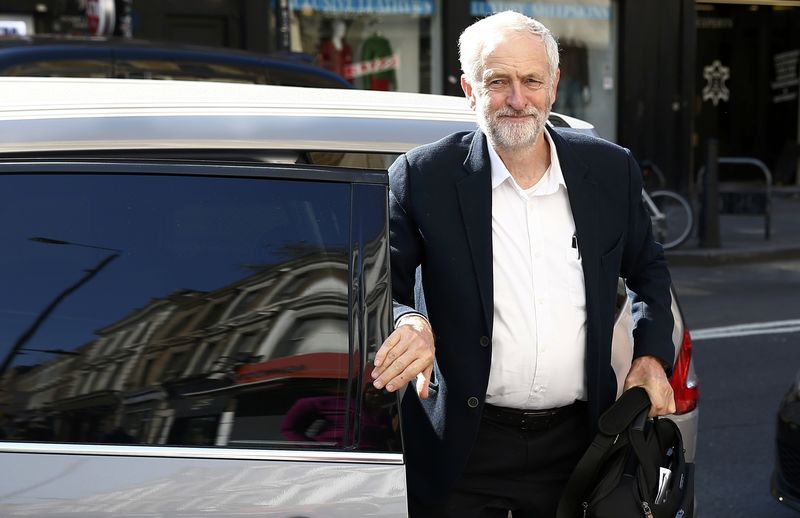By Elizabeth Piper
LONDON (Reuters) - Thanking grassroots supporters who look set to keep him in charge of the Labour Party, Jeremy Corbyn seems unruffled by accusations from fellow MPs that his left-wing agenda will never deliver election victory.
The veteran campaigner is almost certain to see off what his supporters call a "disgraceful" coup attempt by the party's more centrist establishment and win re-election on Saturday, a break with the centre-left path that is mirrored across Europe.
"We, all of us, have mounted a most incredible campaign, mobilised a lot of people and we've actually changed the political discourse in this country," Corbyn said to cheers from volunteers helping him in central London on the last night of his campaign to retain the leadership of the party.
It has been a bitter struggle for the heart of Labour in which both sides have cited the need to heal the deep divisions in British society exposed by the dynamite public vote in June to leave the European Union.
Personal attacks, allegations of anti-Semitism and abuse have become more commonplace than policy debates within Labour since Corbyn beat three more centrist candidates to the leadership last year.
The discord has crimped the party's support in the polls and for many Labour MPs the future looks bleak.
They say Corbyn is too left wing for voters who returned the Conservatives to power just last year, which means the ruling party will have a free rein to pursue austerity policies and plot a divorce from the EU they fear will push Britain to the right.
Corbyn's supporters say the MPs have misread the public mood. They argue that voters' rejection of the European Union was driven by public frustration at inequality and call his expected victory the next step towards a "different kind of politics" to make Britain fairer.
"We have been ... involving people in politics that matters," he told his supporters, many of whom had spent hours phoning Labour members to persuade them to back Corbyn in the leadership election just hours before the polls closed.
Almost mobbed after speaking, Corbyn commands an affection that verges on hero worship. His supporters want to have selfies with him, to get close to him and many hang on his every word.
But the fierce loyalty he inspires, which has helped more than double Labour's membership over the last year to 551,000 people, has a flip side. The almost two thirds of his parliamentary colleagues who say they have no confidence in him have felt the wrath of his supporters.
Owen Smith, the Labour lawmaker who is challenging Corbyn to the leadership and looks set to lose, is a major target.
"They behaved like traitors, they are corporatists, not in touch with working people," said Mohtashim Shaikh, a 63-year-old retired project manager from southeast London. "The old Labour Party is dead ... Corbyn is the first genuinely honest and honourable leader for decades in this country."
TIME TO UNITE?
Corbyn, 67, has long sat on the left of the party, voting against centrists such as former Prime Minister Tony Blair and lobbying with others to restore more socialist policies. A peace campaigner, he is opposed to Britain having nuclear weapons.
He did not court power, never expected to win it, and soon felt the backlash.
Fellow MPs criticised him for a lack of leadership and what they said a lukewarm campaign to keep Britain in the European Union, which he wants to reform. In late June, 172 of his colleagues passed a motion of no confidence.
The tussle between Labour's two wings is by no means new, and the groundswell for change that brought Corbyn to power is mirrored across Europe, where centre-left parties have lost support to anti-establishment movements that have emerged since the 2008 economic crisis.
Labour, which ruled for 13 years until 2010, was dealt a crushing defeat last year by the Conservatives who cast doubt whether the party's left-wing policies would protect the economy and still lead in opinion polls, by seven percentage points.
Both of Labour's wings have appealed for unity and rule out a split while working behind the scenes to try to gain complete control over the party machinery, resulting in hours of talks but no compromises.
Discussions will continue at the party's annual conference this weekend in the northwestern city of Liverpool, where the results of the leadership contest will be announced at 1045 GMT.
Centrist MPs say unless Corbyn broadens his appeal beyond the young and urban voters they say he relies on, he faces little chance of ever being elected prime minister.
"We have to grow the collective and be that big, broad church," centrist Labour lawmaker Chukka Umunna told a panel discussion last week. "I thought that was an argument which was resolved in the party some time ago."
Some of those closest to Corbyn doubt the battle is over.
"(I) haven't heard many people talking about a coup immediately after this one, so that's an improvement," joked Jon Lansman, an organiser of Corbyn's election bid and chairman of Corbyn-supporting campaign group Momentum.

"Things are getting better, but who knows what's going to happen."